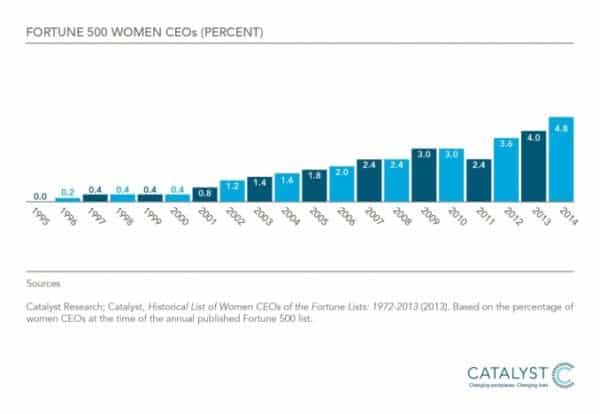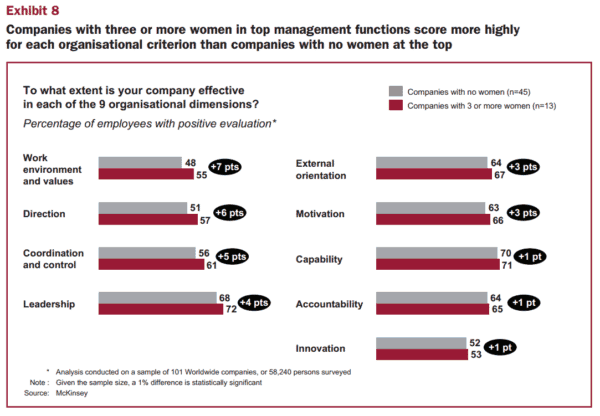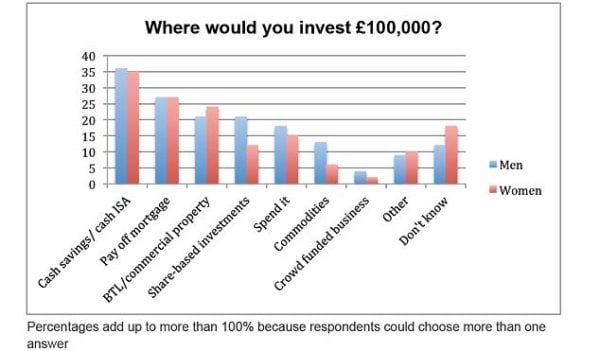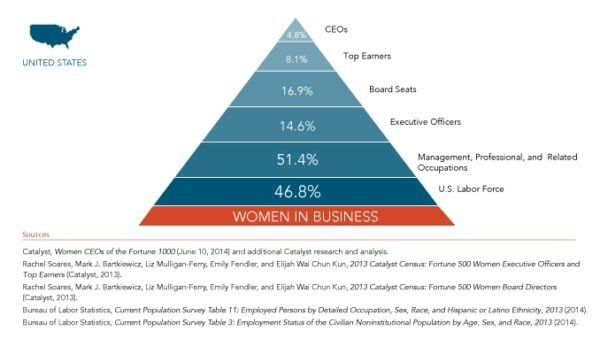Why do we want more women in business? Practicing gender equality is usually not the reason one starts a company. Are men making a mess of our economies and companies? Is “the men’s world” not functioning or failing in creating sustainable growth within our economies? No, not really. The vast majority of men in companies are good people and devoted individuals. By no means are men the ‘wrong-doers’ and should be replaced because of such a (faulty) reason. Then why does this discussion matter?
Women make companies perform better
 Numbers don’t lie, especially not when they’re provided by McKinsey & Company: companies with some 30% or more women in top level functions, perform better. A lot better actually, according to McKinsey & Company’s yearly report “Women Matter”. These companies have better return on equity, 11.4% vs. companies who have significant lower amounts of women in their top layer of the company. In addition, operating results are better (11.1% vs. 5.8%) and stock price growth is also significantly better (64% vs. 47%). Women like Marissa Mayer and Sheryl Sandberg are examples of what women could potentially contribute to a company.
Numbers don’t lie, especially not when they’re provided by McKinsey & Company: companies with some 30% or more women in top level functions, perform better. A lot better actually, according to McKinsey & Company’s yearly report “Women Matter”. These companies have better return on equity, 11.4% vs. companies who have significant lower amounts of women in their top layer of the company. In addition, operating results are better (11.1% vs. 5.8%) and stock price growth is also significantly better (64% vs. 47%). Women like Marissa Mayer and Sheryl Sandberg are examples of what women could potentially contribute to a company.
In addition, in 2040 Europe is expected to need another 24 million people to tackle the workload, and women are already there. Another reason why we need more women on the work floor is that they’re usually the main decision unit in household purchases, and I’m not talking about groceries. Women spend 71% of the household budget. In Japan, 60% of the women are responsible for choosing a car (now there’s a man’s-world industry for you) and in Europe 47% of the PC’s are bought by women. Notice the “glam” redesigned notebooks that are now available? Notice the advertisers bragging about low weight PC’s? You know why. Then why is it that, according to the Boston Globe, a company pitched by men is 40% more likely to receive funding? And how can crowdfunding change that?
It’s Partially Women’s Own Fault
 A lot of women simply approach things differently. If you ask women why a project was successful, about 70% will tell you they were lucky, they worked hard, etc. Men will tell you they’re awesome, says research. In addition, women tend to not discuss their success and attribute it to others (the team). Costa Rica’s first female president, Laura Chinchilla says women are seen as weak because of this: “We understand success not as the result of just one person but as the result of a team,” she told Forbes’ writer Jenna Goudrau. “[It’s a] different way of dealing with power [that] is misunderstood as a kind of weakness.”.
A lot of women simply approach things differently. If you ask women why a project was successful, about 70% will tell you they were lucky, they worked hard, etc. Men will tell you they’re awesome, says research. In addition, women tend to not discuss their success and attribute it to others (the team). Costa Rica’s first female president, Laura Chinchilla says women are seen as weak because of this: “We understand success not as the result of just one person but as the result of a team,” she told Forbes’ writer Jenna Goudrau. “[It’s a] different way of dealing with power [that] is misunderstood as a kind of weakness.”.
On top of that, women deal with “double trouble”. First, it’s difficult to what Sandberg (and McKinsey & Company) to the “double workload”: raising a family and developing your career. Reports show that in the case were equal companies pitched by either a man or a woman, the man was more likely to receive funding. The reason? Maybe a story sounds more familiar to man when it’s told to him by another man, we don’t like what’s unfamiliar. Much the same way society might prefer a female child care taker instead of male childcare worker, a.k.a. “Manny”..
The Solution is Part of the Problem
 If we want more women in business, what’s stopping us? Well, the women are actually. They stick together in Women’s Clubs, Women’s Awards, etc. Personally, if someone ever handed me the award for “Best company with a female CEO”, I’m not sure I’d appreciate it: “Here’s your consolidation prize, now go play with the other kids”, or, “You’re not bad at all.. for a woman”. It sucks to be considered a second rank “leader”, or cheerleader, as was Sarah Palin.
If we want more women in business, what’s stopping us? Well, the women are actually. They stick together in Women’s Clubs, Women’s Awards, etc. Personally, if someone ever handed me the award for “Best company with a female CEO”, I’m not sure I’d appreciate it: “Here’s your consolidation prize, now go play with the other kids”, or, “You’re not bad at all.. for a woman”. It sucks to be considered a second rank “leader”, or cheerleader, as was Sarah Palin.
Then why do women do this? Because men do it too. The (in)famous “old boys network” didn’t spontaneously come into existence. Men-only business and networking clubs (as insightfully described by The Guardian) have existed for over hundred years, plenty of time to establish the beginning of the just as infamous glass ceiling. And even though “Women-only clubs” aren’t going to completely solve the problem, I can definitely imagine that it’s easier to pack some punch when somebody has your back. And why desperately try to build that back up framework with a group of people that need some serious convincing (men), when you have another group of people that is very willing and open to support you: women. And though I have some serious doubts about this form of separatism, there is one specific area in business where women might actually help each other conquer the business: online investing.
Women Investing in Women: online
 In order to get more women in (offline) businesses we need to activate women to pick up projects or start up companies. Tough when you’re faced with the barriers above but much easier when you create an environment where those barriers are minimized. Women have the tendency to fund a larger part of their company themselves as it’s harder for them to come by via men, according to USA Today. The result? A company that has fewer resources to fully develop its potential. The solution? Ask a woman to crowdfund the initiative instead of raising funds in the traditional way.
In order to get more women in (offline) businesses we need to activate women to pick up projects or start up companies. Tough when you’re faced with the barriers above but much easier when you create an environment where those barriers are minimized. Women have the tendency to fund a larger part of their company themselves as it’s harder for them to come by via men, according to USA Today. The result? A company that has fewer resources to fully develop its potential. The solution? Ask a woman to crowdfund the initiative instead of raising funds in the traditional way.
First, the chances of raising funds via a lot better. 42% of Indiegogo’s successful projects are run by women, says Geri Stengel’s Forbes contributor. These crowdfunding campaigns are often mostly funded by other women, according to. They also raise some 11% more money than men, and according to USA Today, women make better investors because: 1) they focus on long-term, non-monetary goals; 2) they are less prone to take unnecessary risks and do quality research; and 3) that men trade 45% more than women, leading to a loss of 2.65% on men’s net returns. And women lead campaigns get 1.3 more followers than men lead companies, according to CrowdExpert.
How does crowdfunding success get more women in business?
 Women get a fair chance. No (or less) bias, more access to more investors, both men and women that, in contrary to the established funding industry, are willing to take chance in a woman lead company. There is more money flowing in women’s initiatives, giving women the chance to prove their potential. In establishing great cases, more women like Sandberg and Mayer earn a place in the spotlight, increasing the society broad idea that women can actually achieve something. That way, more and more people (men and women) get the live demonstration of what already has been proven: women make business better.
Women get a fair chance. No (or less) bias, more access to more investors, both men and women that, in contrary to the established funding industry, are willing to take chance in a woman lead company. There is more money flowing in women’s initiatives, giving women the chance to prove their potential. In establishing great cases, more women like Sandberg and Mayer earn a place in the spotlight, increasing the society broad idea that women can actually achieve something. That way, more and more people (men and women) get the live demonstration of what already has been proven: women make business better.
Final note of the author: I’ve never been much of “we need more women”-person. I believe in hiring the best and if that’s not a woman, I’m fine with that. As a result I was totally unaware of the fact that companies with a certain amount of women perform better, before writing this article. In addition, doing my research for this article I’ve noticed this discussion is very extensive (and quite interesting really) and I haven’t addressed all the related points on purpose. If you have any subjects you’d like to touch, feel free to share them in the comments.
________________________
 Ludwine Dekker has been coaching entrepreneurs in executing their digital fund raising for three years. As a digital marketing specialist, she specializes in entrepreneurship, technology and fund-raising. As a campaign manager at Symbid she strategically manages the entrepreneur’s campaigns and requirements, organizes pitch events, frequently writes for several platforms, and gives workshops.
Ludwine Dekker has been coaching entrepreneurs in executing their digital fund raising for three years. As a digital marketing specialist, she specializes in entrepreneurship, technology and fund-raising. As a campaign manager at Symbid she strategically manages the entrepreneur’s campaigns and requirements, organizes pitch events, frequently writes for several platforms, and gives workshops.


